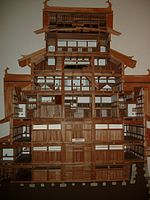Irori: Difference between revisions
Appearance
Content deleted Content added
Kenchikuben (talk | contribs) added image |
m clean up, typo(s) fixed: counter balance → counterbalance using AWB |
||
| Line 1: | Line 1: | ||
[[Image:Japanese Traditional Hearth L4817.jpg|thumb|230px|right|Irori]] |
[[Image:Japanese Traditional Hearth L4817.jpg|thumb|230px|right|Irori]] |
||
[[Image:Kabuto Kazari -01.jpg|thumb|250px|a ''jizai kagi'' hearth hook with fish-shaped |
[[Image:Kabuto Kazari -01.jpg|thumb|250px|a ''jizai kagi'' hearth hook with fish-shaped counterbalance]] |
||
'''Irori''' (いろり, 囲炉裏, 居炉裏) are a type of traditional sunken [[hearth]] common in [[Japan]]. Used for heating the home and cooking food, irori are essentially square pits in the floor with a pot hook, or '''jizaikagi''' (自在鉤). These hooks generally were hollow [[bamboo]] tubes containing an iron rod, with an attached lever, often shaped like a fish, that would allow the pot or kettle to be raised or lowered.<ref name = "fahr, p196">Fahr-Becker (2001), p196</ref> |
'''Irori''' (いろり, 囲炉裏, 居炉裏) are a type of traditional sunken [[hearth]] common in [[Japan]]. Used for heating the home and cooking food, irori are essentially square pits in the floor with a pot hook, or '''jizaikagi''' (自在鉤). These hooks generally were hollow [[bamboo]] tubes containing an iron rod, with an attached lever, often shaped like a fish, that would allow the pot or kettle to be raised or lowered.<ref name = "fahr, p196">Fahr-Becker (2001), p196</ref> |
||
| Line 13: | Line 13: | ||
[[Category:Japanese home]] |
[[Category:Japanese home]] |
||
[[Category:Fireplaces]] |
[[Category:Fireplaces]] |
||
{{Japan-struct-stub}} |
{{Japan-struct-stub}} |
||
Revision as of 02:42, 19 November 2013


Irori (いろり, 囲炉裏, 居炉裏) are a type of traditional sunken hearth common in Japan. Used for heating the home and cooking food, irori are essentially square pits in the floor with a pot hook, or jizaikagi (自在鉤). These hooks generally were hollow bamboo tubes containing an iron rod, with an attached lever, often shaped like a fish, that would allow the pot or kettle to be raised or lowered.[1]
Footnotes
- ^ Fahr-Becker (2001), p196
References
- Fahr-Becker, Gabriele (2001) [2000]. Ryokan - A Japanese Tradition. Cologne: Könemann Verlagsgesellschaft mbH. ISBN 3-8290-4829-7.

